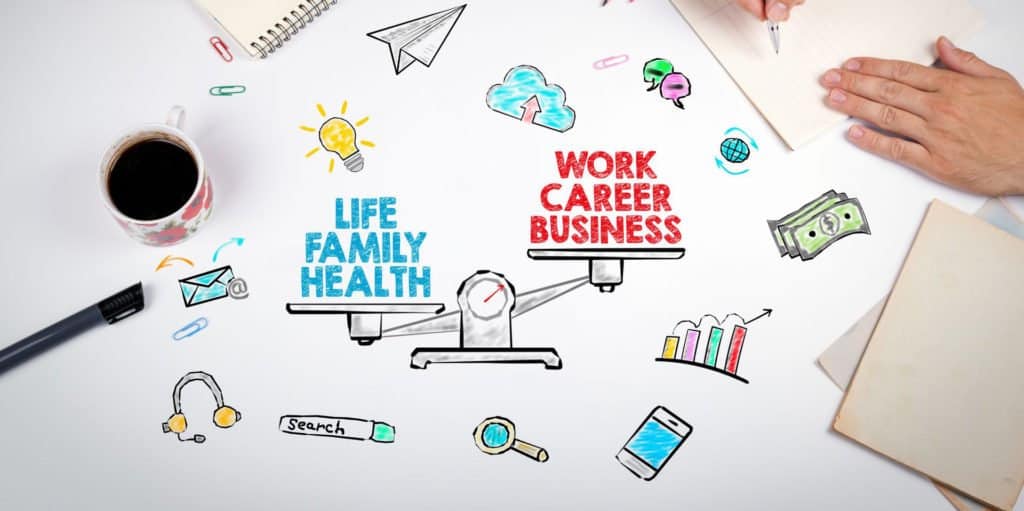There are moments in life that need more attention than others. That’s why it’s crucial to find a great work-life balance.
There might be a work deadline or assignment that needs to be completed and you need to focus your energy to make sure the task is done right.
What happens though when your tasks repeatedly take over and become too much? We can become ineffective in our work, make mistakes or even become cynical. We can believe that if we stop, nothing will get done. It is important to have warning signs of when your workload is becoming to much in order to put strategies in place.
Let’s look at some warning signs to evaluate your work-life balance:
Basic physical signs
- How is your sleep going? Are you staying awake at night working on a project? Are you waking up throughout the night due to an issue at work that needs fixing? Or are you simply not sleeping enough? Between 7-9 hours is recommended.
- How are you eating? In a busy time, we sometimes are on edge with coffee pumping through our veins, often forgetting to eat or just eating unhealthy high energy foods.
Your normal work day
- What does your work day look like? Are you constantly chasing your tail with new tasks that come up? Or do you have a list of tasks that need to be completed?
- Is there ability to finish a task fully before moving onto something else?
- How much of a break do you get at work?
- When do you turn off your computer and have ‘home time’ and ‘work time’?
The team
- Do you feel supported in your role?
- Is there someone else you can ask questions related to a task? Are you able to ask for help when you need it?
- Can you talk to someone about feeling under pressure?
Some last questions
- How are you coping? If we scaled your regular stress levels (‘0′ being calm and ’10’ being overwhelmed) how often would you hit a 10 throughout a day?
- When was the last time you had a holiday or a decent break?
- How do you slow down?
Regularly checking on these questions will help shape a better work/life balance as we often miss the basic signs of overload.
In our busy, fast-paced busy lives many of us are time poor, constantly running around and juggling things.
A good work-life balance means you have harmony between different aspects of your life. That means you are spending time at work, as well as with your friends and family, and having leisure time.
Safe Place Therapy believes in the importance of prioritising and making time for the things that bring meaning into your life.
Research has shown that people who are particularly vulnerable to struggling with work-life balance are:
- Women – who often do around twice as much caring and domestic work than men.
- Parents – particularly mothers, and people in caring roles, caring for a sick, older person, or disabled family member.
- People in certain types of jobs – like managers, professionals and those in the mining industry.

Seven tips to help you think about Work-Life Balance:
- Track Your Time – to get an idea where you spend your time or if it can be used differently.
- Determine Your Priorities – reflect on what is important to you and think about reduce time on things with low importance.
- Schedule time – make sure you schedule time for leisure or quality family time.
- Create Boundaries – communicate with work that there are certain times that you will not check emails or take call.
- Take care of your physical health – if you take care of your physical health it has a positive effect on a person’s sense of wellbeing and coping strategies.
- Make time for yourself – do things for yourself that energies and cares for yourself.
- Leave work at work – learn how to turn your brain off so you are not thinking about work when you are home.
The two key steps here are building awareness of where the problems areas are, and then making time and problem-solving how to change this. Time is a construct that humans have made. Even though it’s hard because all of your commitments, you can make time to stop, reflect, and try something.
Feel more balanced and less burnt out
We can keep doing what we are doing or try something to shift things. One way to try and understand what’s missing is to remember a time where you did feel more balanced and less burnt out.
Ask yourself, what was I doing? What was I like? How does life compare now to then? Breaking these two points down and then placing small goals to reach that previous state can clear up steps forward.
Perspective and hitting the pause button can really help us on our way to balancing better.
The word ‘stuck’ comes to mind when clients walk in and are completely unable to see the problem areas of work or life that stop them living the life that they want.
They feel unmotivated, confused and frazzled in the constant juggling. Coming to counselling can be a great way to talk through your current stressors and slow down the juggling. Take the time to name the issues and notice what’s going on with another person outside of your life.
It’s okay to say you’re stuck and ask for help. Our team are ready to support you move forward in a more balanced way.
Nigel March gives a great conference about work-life balance in this TED talk.
You can check some more information on mental health here.
Would you like to talk to a counsellor about how to improve your well being and work-life balance? Please feel free to give us a call, or book an appointment with us.



